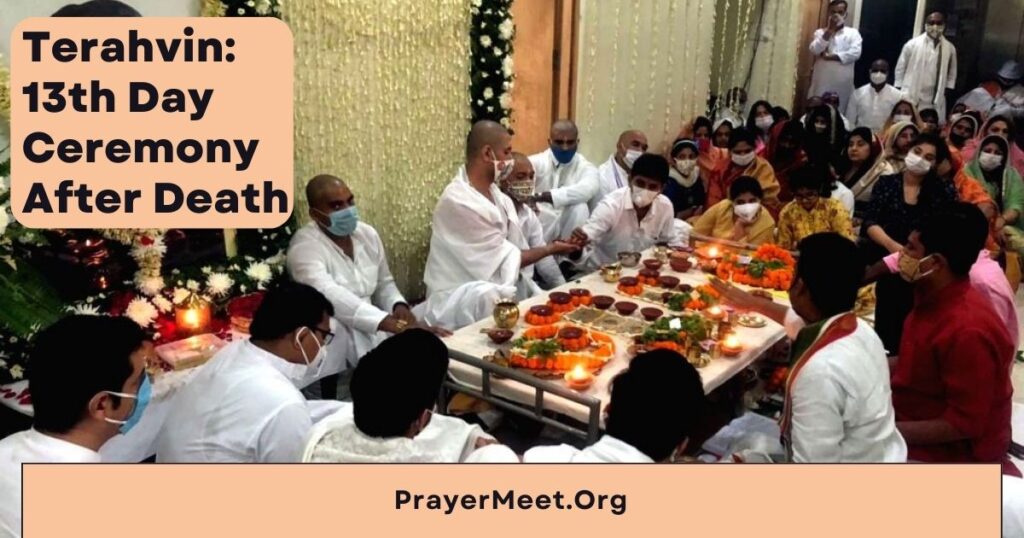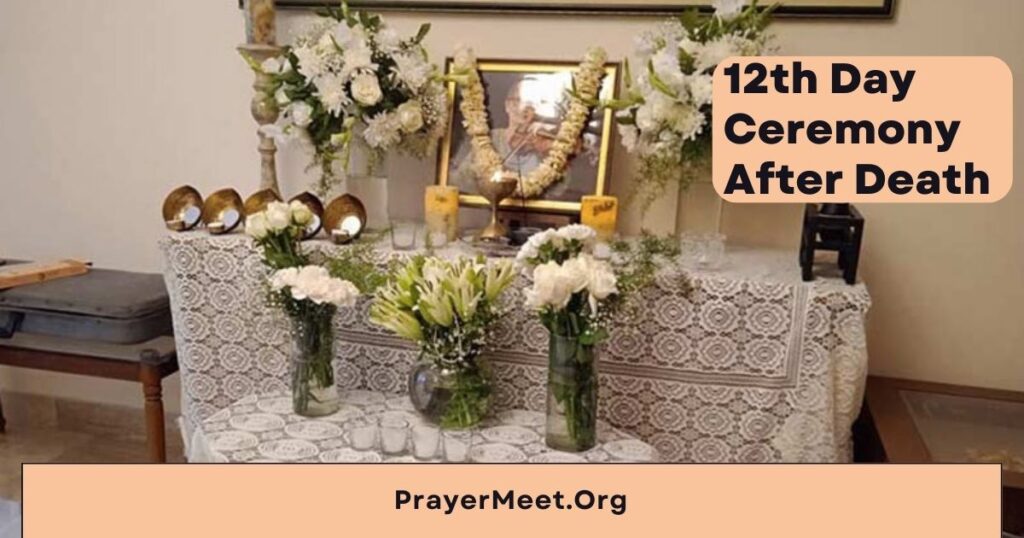Losing someone we love is an indescribable pain that cuts deep into our hearts. The first ten days after their departure are perhaps the toughest, as we go through a sea of emotions, feeling as if nothing makes sense anymore. We long for their presence, their touch, their warm embrace, but suddenly they are no longer there.
In moments of grief and longing, we find solace in rituals that honour our departed loved ones. With a heavy yet hopeful heart, I write this blog today, aiming to provide guidance and support as you navigate the crucial 11th day death ceremony. You are not alone in this journey. Together, we will find a way to honour your loved one.
11th Day Death Ceremony Significance and Purpose
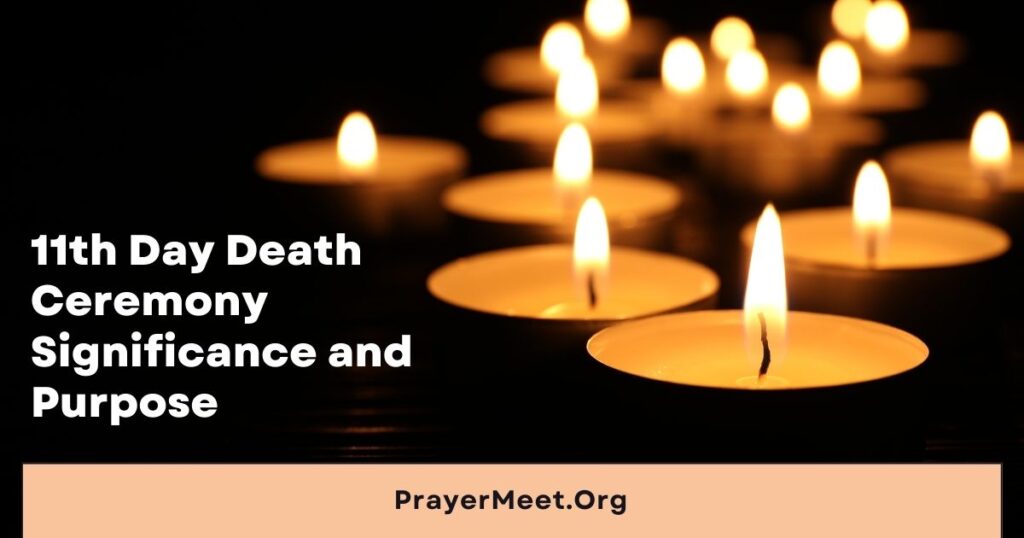
I understand the deep emotions and insecurities that arise when we lose a loved one. We all wish to do everything within our power to ensure that our departed family member’s soul transitions smoothly to the afterlife.
The 11th day death ceremony is to honour and provide solace to your departed family member. This ceremony, known as Swamp Ihuyegu, is a profound way to offer prayers, perform rituals, and make offerings that aid the soul in its transition.
During this ceremony, you will have the opportunity to express your love and gratitude and seek blessings for their soul. It is a time to gather with family and friends. Share stories and memories, and find strength and support in one another.
Rituals for the Hindu 11th Day Death Ceremony
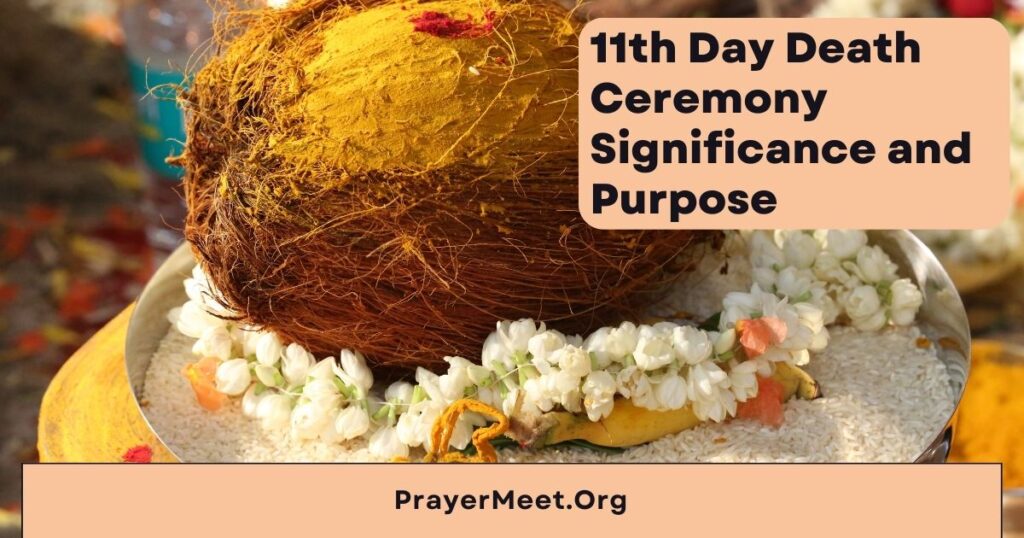
The rituals of the 11th day death ceremony may vary based on cultural traditions, regions, and personal beliefs.
Here are some common yet important practices to honour the departed soul:
1. Visiting a nearby river or sacred water body:
This act symbolises the purification of the soul and is believed to aid its journey toward the afterlife.
2. Offering a Pinda (a symbolic food offering)
During the ceremony, a Pinda (a round-shaped dough) is prepared using wheat flour. The Pinda represents nourishment for the departed soul on its spiritual journey.
3. Performing prayers and chants for the deceased:
Prayers and chants are offered to honour the departed soul and seek blessings for their spiritual well-being.
4. Conducting a homa to purify the environment
The homa, or fire ritual involves the sacred offering of ghee (clarified butter) and Shamgiri into a consecrated fire.
In this challenging time of great loss, I hope that these insights into the rituals of the 11th day death ceremony provide some solace and guidance.
11th Day Death Ceremony Decoration
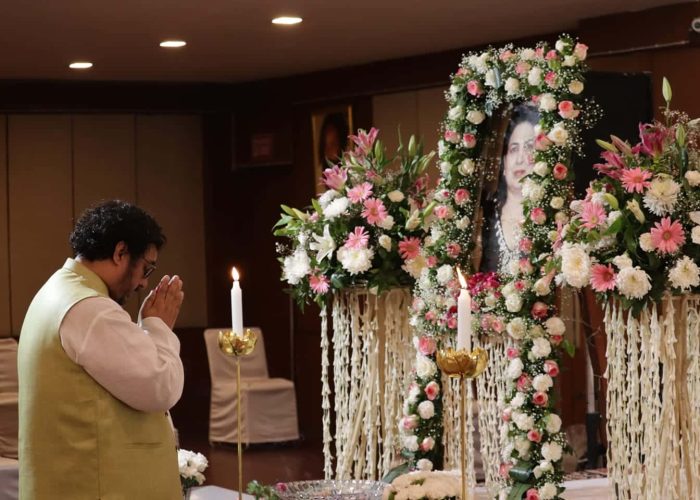
Creating a peaceful atmosphere is important while preparing for the ceremony. It holds deep meaning and serves as a heartfelt tribute to your beloved.
Here are some of the common elements used to create an atmosphere of tranquillity and reverence:
- Flowers: The fragrance and colours of flowers evoke a sense of peace and honour, and they are offered as a symbol of devotion and love for the departed.
- Incense: The aroma of incense fills the air with a sense of spirituality and sanctity.
- Sacred Items: Sacred items such as holy scriptures, religious symbols, and photographs of the departed are often placed in the ceremonial space.
- Soft Lighting: The use of soft and subtle lighting enhances the serenity of the space. Candles or oil lamps are often lit to represent the eternal flame of the soul.
Remember, the essence lies in the intention behind the decorations. It is not about lavish displays.
What is done on the 11th Day of Death?
I understand that every day following the loss of a loved one can be incredibly painful and challenging. On the 11th day of death, family members, especially males of the family, come together at a peaceful riverbank. They offer Preta Pinda to the departed soul. This act serves as a final act of farewell, an expression of love and respect, and a way to honour the memory of the deceased.
How do you invite me to the 11th Day of Death Ceremony?
Inviting friends, relatives, and well-wishers to the 11th day death ceremony is a very sensitive and painful act to do. The invitation should respectfully convey the date, time, and location of the ceremony, along with any specific instructions or requests.
You can also check out our article on prayer meet invite for templates, messages and more details.
How do you write a Death Ceremony Invitation?
As the loving family of the departed soul, I understand that you want to ensure that every aspect is handled with care and respect, including the invitation.
Remember, the purpose of the invitation is to extend an invitation with sincerity, sensitivity, and a genuine desire to have loved ones stand with you during this time of sorrow.
- Death 11th Day invitation letter
[Your Name]
[Address]
[Date]
Dear [Recipient’s Name],
We hope this invitation finds you well.
As a loving family, we would like to invite you to join us for the 11th-day death ceremony in the loving memory of [Deceased’s Name]. We understand the significance of your presence during this challenging time and would be grateful to have you stand by our side.
Date: [Date of the 11th day ceremony]
Time: [Time of the ceremony]
Location: [Venue or address of the ceremony]
Your presence and support would mean a lot to us as we honour and remember our beloved [Deceased’s Name].
We kindly request you to join us for the final farewell to our dear [Deceased’s Name].
[Your Name]
[Contact Information]
Cost of the 11th Day Death Ceremony:
The cost of the ceremony can vary depending on various factors, including the scale of the event, the rituals performed, and personal preferences. Remember, the true significance of the ceremony lies in your intention and devotion, not extravagant expenses. Your loved one would never want you to struggle financially to honour them. It’s your sincere efforts that matter, so give your best without worrying about societal expectations or financial constraints.
- 11th Day Death Ceremony Decoration Costs:
It’s the emotions and the peaceful atmosphere that truly matters, not the price tag. Decorate within your means, focusing on the essence of the ceremony rather than the cost.
Amid grief and loss, the 11th-day death ceremony, Swami Ihuyegu, provides a path to honour and remember the departed soul and closure during the grieving process. As we perform the sacred rituals and invite our loved ones to join us, we come together as a family, offering support and strength to one another. May this ceremony bring peace to the departed soul and comfort to those left behind.
Other Articles to Read:
- Prayer Meet Invitation
- What Exactly is Life After Death?
- 3rd Day After Death in Hindu Tradition
- 12th Day Ceremony After Death
- 16 days After Death: Pitru Paksha
- Terahvin: The 13th Day Ceremony After Death
Dear reader,
As a prayer meet singer, I have witnessed the immense pain and sorrow that accompanies the loss of a loved one. It is important to remember that you are not alone in your grief. It is your strength and resilience that truly matter.
I offer my deepest condolences to you and your family. May you find solace and healing in the memories and love shared with your departed loved one. Remember, it is okay to lean on others for support and to take the time to go through this challenging period.
Please know that you are in my thoughts and prayers. May the 11th-day death ceremony and the rituals performed bring you comfort, peace, and strength.
Charan Ji

